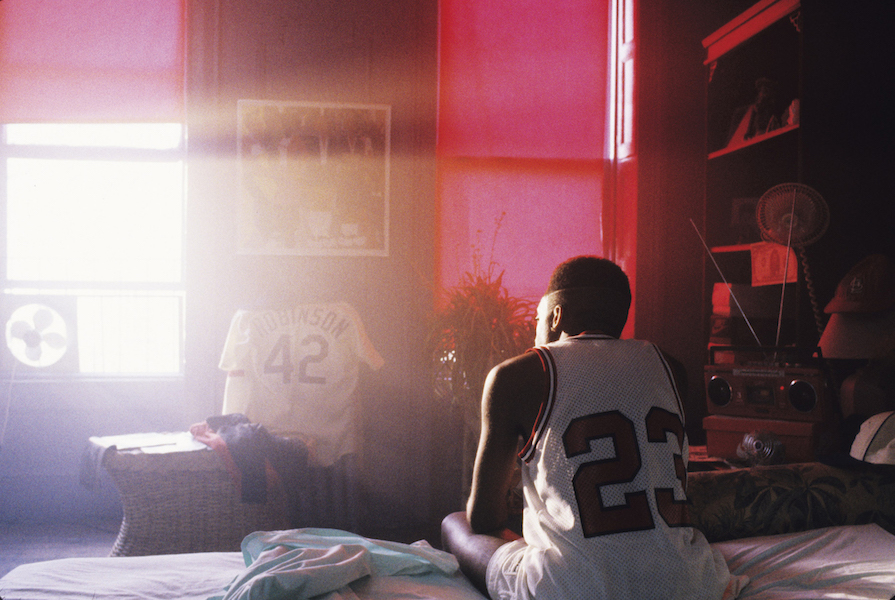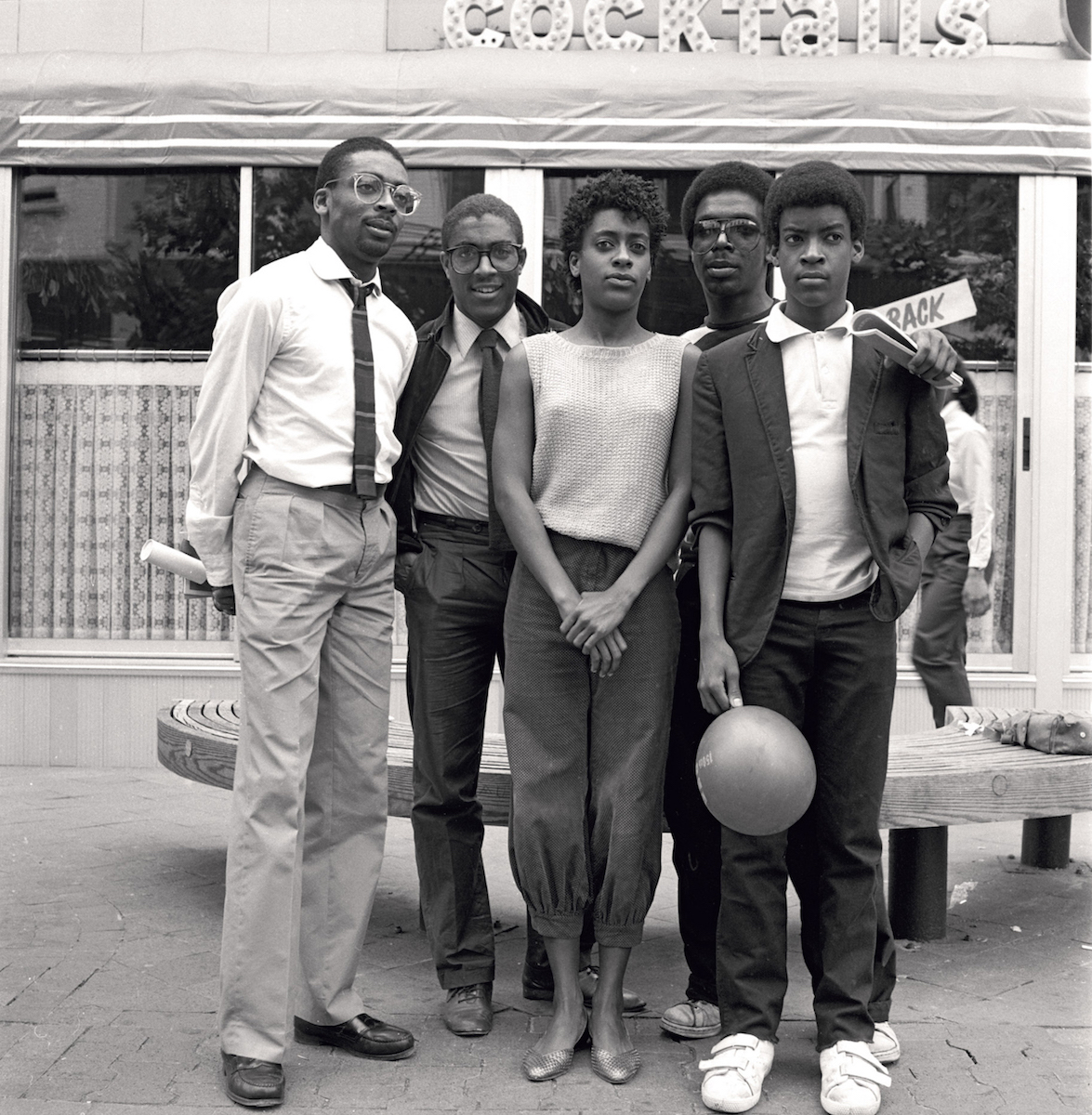A glimpse behind the scenes of Spike Lee films
- Text by Miss Rosen
- Photography by David Lee

“It’s like a family album,” photographer David Lee says of Spike (Chronicle), the visually dazzling celebration of Spike Lee’s groundbreaking film career. Spanning five decades, Spike offers a film-by-film look behind the scenes, replete with film stills, on-set photographs, personal images and insights from Spike Lee.
As Spike’s younger brother, official on-set photographer, and lifelong collaborator, David Lee has played an integral role in the family business — one that took root in Brooklyn. In the late 1960s, the Lee family moved to Fort Greene and bought a brownstone on the park. “There was so much creativity in the house. Our dad is a musician: he taught me piano, Spike played violin, and my sister Joie played bass. My mom was an educator so we knew about the Harlem Renaissance.”

Spike Lee as Mookie in “Do the Right Thing,” 1989 Universal City Studios, Inc.

Spike Lee directs the short film for Public Enemy’s “Fight the Power,” 1989, by David Lee
Lee remembers admiring the work of his brother Chris, a trailblazing graffiti writer who went by the pseudonym SHADOW. Though Lee couldn’t draw, he discovered a way to visually express himself through photography — and, as fate would have it, such a skill would serve the burgeoning family business well.
“Spike was always the general,” Lee remembers. “Whether shooting something for his films or wanting me to be the catcher on the baseball team, he was always organising.”
With his distinctive mix of history, drama, satire, and style, Spike Lee has transformed the landscape of filmmaking to broaden the way Black stories are seen and told. David Lee’s poignant and evocative photographs made on the set of films including Do the Right Thing, Malcolm X, Crooklyn, 4 Little Girls, and Summer of Sam, offer a glimpse inside the iconoclastic mind of the auteur.

Denzel Washington as Malcolm X outside the Apollo on 125th Street, from “Malcolm X,” 1992, by David Lee. Warner Brother Studios All Rights Reserved.

My High School Graduation With My Grandmother. Courtesy of Spike Lee.
“Spike is not just incredibly visual, but he has always had a sense of how to promote something,” Lee says. “When we were working on Mo’ Better Blues, he had this concept inspired by [jazz photographer] William Claxton. It was a little sub current to the movie. When I got a chance to shoot the actors, I made it stylised but still related to my portraiture so that our sensibilities were in step.”
Spike in turn hired Claxton to shoot colour advertising work for the film. “Spike has good sense of what’s effective,” says Lee. “There’s this wealth of imagery — it’s almost like having historical references coursing through your blood, and he might not even be completely aware of it, but it’s registering on some level.”
Having worked side by side over the past five decades, Lee’s photographs reveal an intuitive ability to complement his brother’s kaleidoscopic approach to filmmaking that always pushes the boundaries, both aesthetically and conceptually.
“Spike allows me the space to make my own contribution and create a moment that is not a scene from the movie but conveys [the spirit] of it. I get a chance to do my own improvisation,” says Lee, a lifetime member of the band.

Graduation Day. NYU Graduate Film School. Courtesy of Spike Lee.

David Lee. On the set for “She’s Gotta Have It,” 1986.

Spike Lee and Ernest Dickerson by David Lee

Spike Lee and Ernest Dickerson on the set for “She’s Gotta Have It,” 1986, by David Lee

Denzel Washingto as Bleak in “Mo’ Better Blues,” 1990, by David Lee. Universal City Studios, Inc. All Rights Reserved.

Spike Lee as Mookie in “Do the Right Thing,” David Lee,1989 Universal City Studios, Inc. All Rights Reserved.
Spike is available on Chronicle Books.
Follow Miss Rosen on Twitter.
Enjoyed this article? Like Huck on Facebook or follow us on Twitter.
You might like

Jake Hanrahan: “Boys can cry, but we don’t all fucking want to”
Hard Feelings — In the latest edition of our column on masculinity and fatherhood, Rob Kazandjian speaks to the conflict filmmaker-journalist and Popular Front founder about his childhood, the found family and community at his Muay Thai gym, and the “complete counterculture” of ‘no rules’ fighting.
Written by: Robert Kazandjian

Euphoric portraits of queer joy and resistance at Trans Pride Brighton
Let us piss — Now over a decade old, the event grew to become Europe’s largest trans pride march. In a year when trans rights have come under the microscope more than ever, we went to this year’s edition, finding grassroots unity and collective rage.
Written by: Ella Glossop

Remembering the radical anti-nuclear Greenham Women’s Peace Camp
Life at the Fence — In the early ’80s, a women’s only camp at an RAF site in Berkshire was formed to protest the threat of nuclear arms. Janine Wiedel’s new photobook revisits its anti-establishment setup and people.
Written by: Miss Rosen

Warm, tender photos of London’s amateur boxing scene
Where The Fire Went — Sana Badri’s new photobook captures the wider support networks and community spirit around the grassroots sport, as well as the significance of its competitions to the athletes who take part.
Written by: Isaac Muk

Alex Kazemi’s Y2K period novel reminds us that the manosphere is nothing new
New Millennium Boyz — Replete with MTV and endless band t-shirt references, the book follows three teenage boys living in 1999 USA as they descend into a pit of darkness. We spoke to its author about masculinity, the accelerated aging of teenagers, and the rebirth of subcultures in the algorithm age.
Written by: Isaac Muk

We are all Mia Khalifa
How humour, therapy and community help Huck's latest cover star control her narrative.
Written by: Alya Mooro

